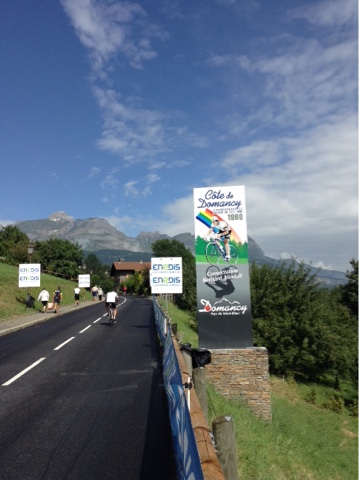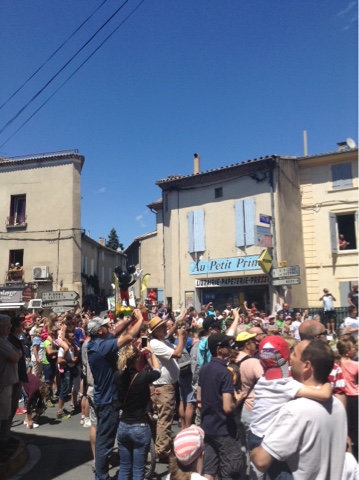This was only the second time I've made it to Paris in time to ride the final stage into the city from one of its outlying suburbs, so I wasn't well versed in how eager the gendarmes would be to close down the course. They could either be extra draconian or they could be very relaxed about it, not wanting to antagonize and strangle the urban traffic. Not knowing, I was a little nervous when I got a belated start on the forty-mile ride from Chantilly, north of the city, to the Champs Elyées, where the peloton would make eight four-mile circuits of the cobbled boulevard.
There were quite a few other cyclists riding the course. Most were MAMILs, but there was a fair representation of many of the other subsets of the cycling clan from kids to grandmothers. Even though Chantilly was less than twenty-five miles from the center of Paris by a direct route, it was more of a distinct city than a suburb. It had a chateau and was surrounded by a large forest and farmland. The Tour route passed through a couple of other distinct towns before it entered the great Paris metropolis. Once I reached the extended city I no longer feared being halted, as there were sidewalks to ride and parallel streets.
With all the cyclists on the route I didn't have to be much concerned with going astray. There is a greater chance that course markers will be prematurely appropriated by eager fans or delinquents in urban environments, but the markers seemed to be pretty much in place. I did though come upon a cyclist in the act of stuffing a marker up the backside of his jersey. He was stopped at a light and was accompanied by two women. He asked them in English with an American accent, "Is it well enough hidden?" He had put the yellow side facing out and it was just peaking above his jersey at his neck. If he had been thinking, he would have put the bright, distinctive yellow side against his back and the bland white side facing out, but the women said it looked okay.
I was appalled at this act of vandalism. A course marker is a highly coveted object by all Tour followers, but there is a near universal sense of honor among them to leave them in place until after the peloton has passed. Then they are fair game. On those rare occasions when I come to an intersection that is missing a course marker, I feel a sense of rage that someone made off with it, and I felt rage towards this arrogant, affluent, entitled American. I blurted, "That's contraband." He seemed surprised to hear someone speaking English. He smiled, as if I were joking and perhaps congratulating him on his theft of this prized momento, until I added with deadly seriousness, "It's a mortal sin to take one of those before the peloton has passed. No one does such a thing."
"There was another nearby, so it wasn't really necessary," he replied, then continued, "These are worth a lot of money back home. I tried to get one on another stage but failed."
"If you really want one, you can just stand by it until the peloton passes and then take it. I knew a German guy who violated the code and took one early and he later broke the frame of his bike. If you know what's good for you, you'd return that marker right now and beg the pardon of the cycling deities."
He had no answer to that, but ignored my warning and headed down the road with his accomplices. I saw no immediate retribution, but I knew he was doomed. The seeming joy he would derive from gazing upon his marker wherever he mounted it would be negated by whatever travesty the gods had in store for him. Such a shame. If he had come upon it honorably it would have lit up his home and his heart for years to come.
The route continued to the Seine and then turned away from the Champs Elysées before crossing the river on the Pont de Suresnos. Then it doubled back through the Bois de Boulogne. Portions of the route were already closed to motorized traffic, but we on bikes were still welcome. I was less than an hour ahead of the caravan at this point, but the gendarmes gave no hint of being itchy about closing down the course. They seemed casual and easy-going, enjoying this light duty and not bent on exerting their authority. Few fans had gathered until I neared the Champs Elysées. Fencing had been put up several blocks away from it and spectators were being funneled in through checkpoints where their bags were being searched. The lines were long. I knew there was little chance of me being allowed in with all the bags on my bike. It would have taken half an hour anyway to examine everything in my many bags.
I plopped down at the Louvre, where the peloton would make a sharp turn. The fencing set spectators so far from the route that when the caravan passed all it gave out were waves and smiles. I knew I couldn't get near any of the large screens so I went in search of a small screen. Swarms of people were still flocking to the course, but after I was several blocks away I would have had no awareness The Tour was in Paris. The usual bustle of Paris continued unabated. A guy on a fixie pedaled along with me for a couple of blocks asking about my travels and telling me he had just returned from a tour in Norway. He had other things to do this day than to watch The Tour.
I continued on for several miles beyond the reach of all the popular trendy bars until I found a working-class neighborhood bar. The bartender though still had the notorious Parisian demeanor of having little tolerance for tourists. I had to ask him three times to turn on the television after he had served me my menthe á l'eau. Then he pretended he couldn't find the channel broadcasting The Tour. After he put down the remote control to serve someone else I picked it up and had no problem finding it.
The peloton still had six of its eight circuits of the Champs Elysées remaining. The route had fewer fans along it than I had ever seen. Kittel was off the back making a bike exchange. He was expected to contend with his fellow German Greipel for the win with Cavendish having departed The Race before the Alps. He did catch up, but evidently expended too much energy to be a factor. It came down to Greipel and Kristoff and of course Sagan. Greipel just nipped a fast-charging Sagan, finally winning a stage, and repeating his victory on the Champs Elysées last year. That made it four years in a row that a German had won it after the years of Cavendish dominance--Kittel in 2013 and 2014 and now Greipel the past two years. It also kept in tact Greipel's remarkable record of having won a stage in every Grand Tour he has ridden since 2008 (eleven of them), something Cavendish can't say.
The nine Sky riders crossed the line a minute later lined across the road no-handed with arms on each other's backs. Froome was in the middle in yellow and the rest in a new uniform for the day with a yellow stripe across the chest. Froome was greeted by his wife and young son. The long-time, beloved host of the post-Race show was there with a microphone, but was unceremoniously shoved aside by a Sky minion even though Froome had given him a Yellow Jersey the day before in honor of his retirement.
The 174 riders who finished The Tour is the most ever, meaning the Lantern Rouge, Sam Bennett, had the lowest placing in the history of The Tour. It would have been 175 had not Tony Martin abandoned with knee pain after one lap on the Champs. No one finished The Tour more disappointed though than Mollema and his Trek teammates. He ended up eleventh when he would have been second if he had not been so needlessly aggressive on the descent in the Alps where Froome also fell. He wasn't going to overtake Froome nor did he have to fear anyone overtaking him. His team director was outspoken in his regret at Mollema's error in judgement. Besides the glory of the podium, a second place finish would have won his team 200,000 euros to split among everyone, 300,000 euros less than Sky. Quintana can thank him for allowing him to slip onto the podium in third. He would have been fourth otherwise.
It was twelve miles from the bar to my campsite in a forest beside Charles de Gaulle airport. I nearly bonked and had to stop and make myself a sandwich. When I reached the forest it was near dark, but the jets were still landing on the nearby runway. For the first time ever I noticed a fellow squatter or at least his campsite--a tent with a bicycle beside and a clothes line and a chair, implying it didn't necessarily belong to a traveler. There was no light coming from the tent or evidence of its inhabitant. With the non-stop roar of jets it was unlikely the camper had heard me. I penetrated deeper than I usually do well out of his range. I did give Janina a call to tell her I was in the forest by the Concorde Memorial just in case I didn't survive the night. If I had legitimate concerns I could have relocated to another forest, but it was near dark and I was hungry and fatigued and not all that wary.
Nothing disturbed my sleep, real or imagined. I had just a couple more hurdles and my trip would be complete. Air France was still providing boxes for bikes, so I didn't have a last minute frantic search for an abandoned box from an arriving cyclist or have to rush off to a bike shop. The pedals came off without effort and the box was large enough I didn't have to remove the front rack. All good news. The biggest hassle was standing in lines for nearly two hours to get the box, check in, have my passport stamped and then have my bags X-rayed. It was the longest I had been on my feet since standing in lines at Cannes. Without much air conditioning I was close to passing out. But I had allowed loads of time, so didn't have to fret.
I saw an occasional passenger with a Tour souvenir, but no one else with a bike, just a few people with golf clubs. One ticket agent asked if I had come for The Tour and was thrilled to learn that I had. She had actually been on the Champs Elysées for the finish. I'll have an even greater blast of heat and humidity in Chicago, but Janina and I will be leaving immediately for the North Woods and Michael Moore's film festival in Traverse City. Our bikes will accompany us.


































